Unit 9Can you come to my party? 全面学习can 课件(共24张PPT)人教版英语八年级上册
文档属性
| 名称 | Unit 9Can you come to my party? 全面学习can 课件(共24张PPT)人教版英语八年级上册 | 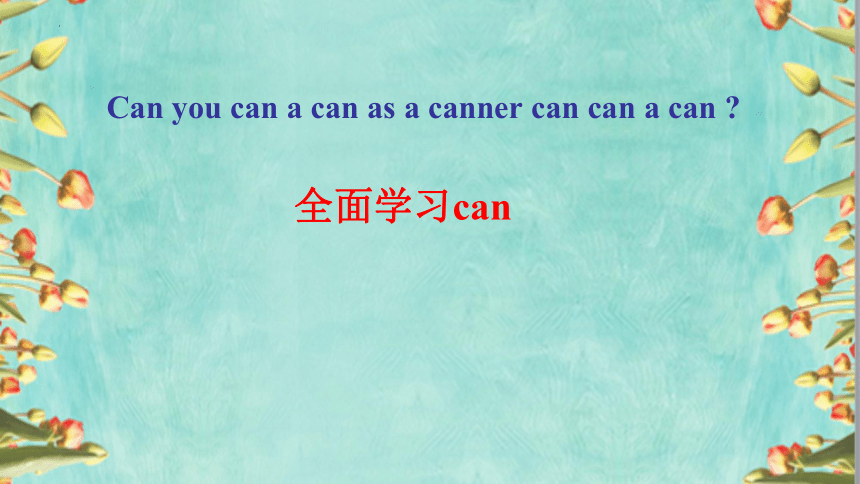 | |
| 格式 | pptx | ||
| 文件大小 | 1.8MB | ||
| 资源类型 | 教案 | ||
| 版本资源 | 人教新目标(Go for it)版 | ||
| 科目 | 英语 | ||
| 更新时间 | 2024-11-24 20:13:53 | ||
图片预览

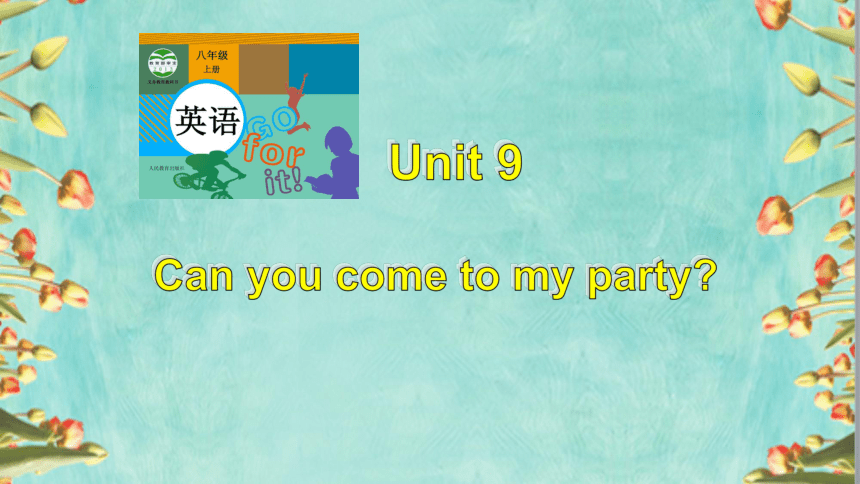
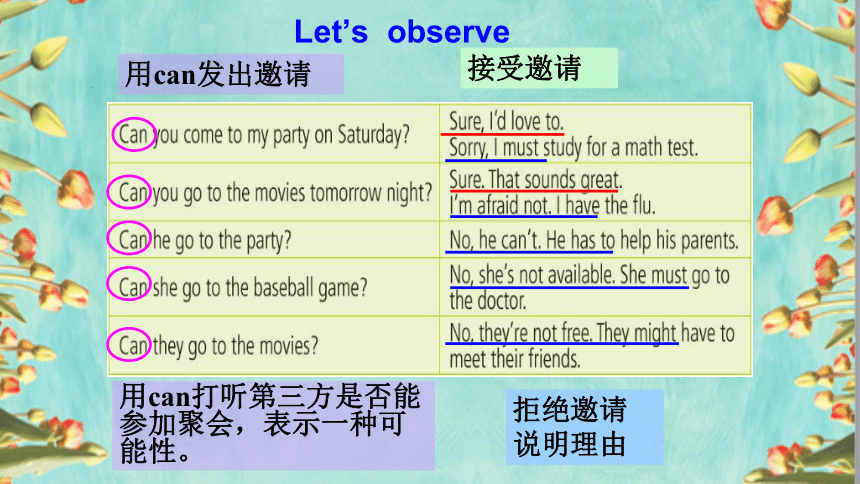
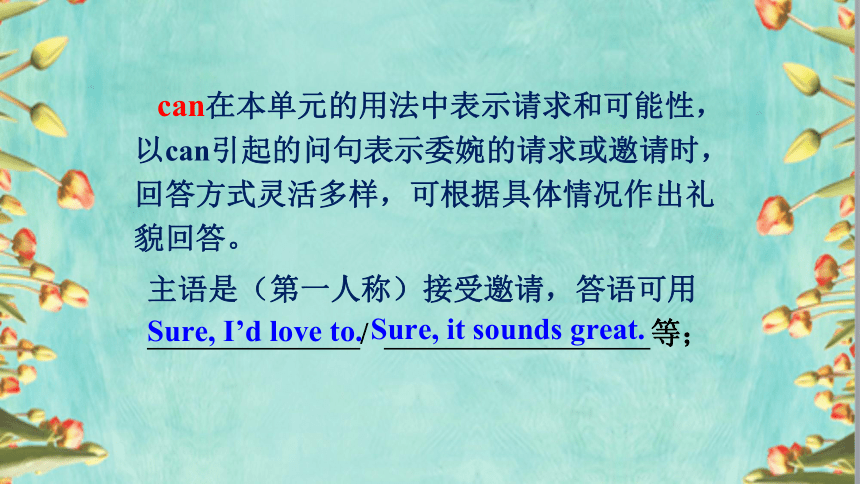

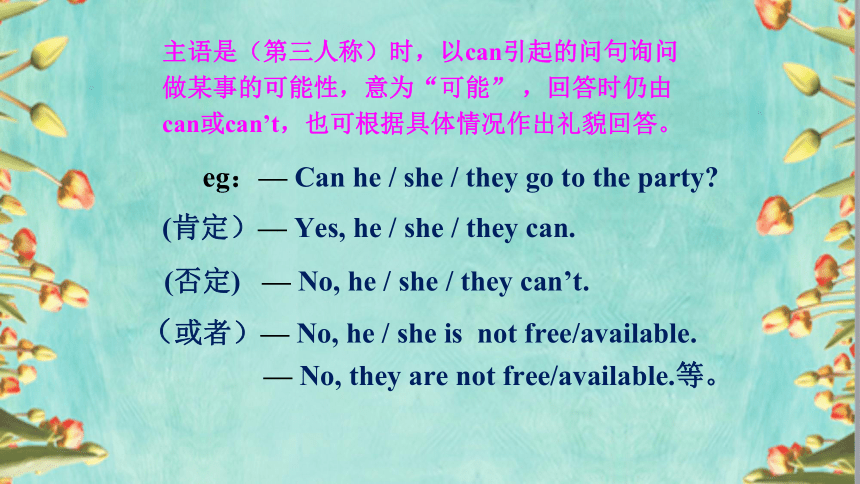
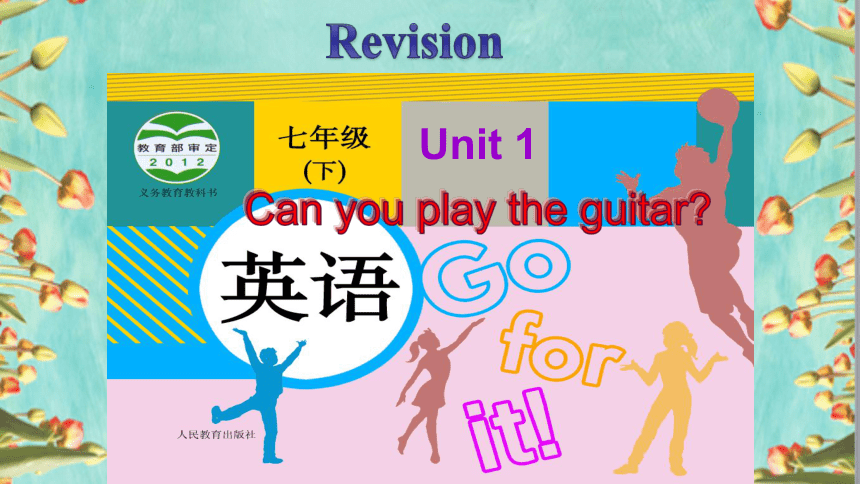


文档简介
(共24张PPT)
Can you can a can as a canner can can a can
全面学习can
Unit 9
Can you come to my party
用can打听第三方是否能参加聚会,表示一种可能性。
用can发出邀请
接受邀请
拒绝邀请
说明理由
Let’s observe
主语是(第一人称)接受邀请,答语可用
/ 等;
Sure, it sounds great.
Sure, I’d love to.
can在本单元的用法中表示请求和可能性,
以can引起的问句表示委婉的请求或邀请时,回答方式灵活多样,可根据具体情况作出礼貌回答。
主语是(第一人称)拒绝邀请,答语可用
Sorry, I’m afraid not.
I might have to/must...
Sorry, I can’t. I might have to/must...
I’m sorry, I’m not free/available.
Thanks for asking/ your invitation.
I might have to/must...
eg:— Can he / she / they go to the party
(否定) — No, he / she / they can’t.
(或者)— No, he / she is not free/available.
— No, they are not free/available.等。
(肯定)— Yes, he / she / they can.
主语是(第三人称)时,以can引起的问句询问做某事的可能性,意为“可能” ,回答时仍由can或can’t,也可根据具体情况作出礼貌回答。
Can you play the guitar
Unit 1
Revision
表示说话人对所说动作的观点,如需要、可能、意愿、怀疑等。情态动词本身虽有一定的意义,但不能单独作谓语动词,必须和不带to的动词原形连用共同构成谓语(have to除外),情态动词没有人称和数的变化。主要有can, could, may, might, must, have to, need, should, had better等。
情态动词can
can意为“能;会”,表示某人在某方面的能力。can既可表示现在的能力,也可表示将来的能力。它没有人称和数的变化,不能独立存在,必须与动词原形一起构成谓语,否定形式是can’t, can的过去式是could。
【用法】
1.肯定句:
主语+can+动词原形(+其他).
【句式】
2.否定句:
主语+cannot / can’t +动词原形(+其他).
4.特殊疑问句:
疑问词(不作主语)+can+主语+动词原形(+其他)
3.一般疑问句:
Can+主语+动词原形(+其他)
肯定答语:Yes, 主语(人称代词)+can.
否定答语:No, 主语(人称代词)+ can’t.
1.我会说英语。
I can speak English.
2.珍妮不会唱中国歌曲。
Jane can’t sing Chinese songs.
Let’s practice
3. —Can you sing in English
— What can you do
— I can sing in English.
—Yes, I can. / —No, I can’t.
(就划线部分提问)
— I can play the guitar.
— What can you do
4.
— Yes, he can .
—Can he do kong fu
5.
—No, she can’t, but she can tell English stories.
—Can she tell jokes
(tell English stories)
6.
— What can these children do
— They can sing and dance.
7.
can / could
2. can和could都可以表示请求、允许,“可以”。用could比用can语气更加委婉和客气,但答语必须用can。
eg: —Could / Can you open the window for me
—Of course I can.
can表示现在或将来的能力,意为“能;会”。could为can的过去式,表示过去的能力。
eg:Helen can play the piano.
Helen could play the piano when she was five.
【拓展一】
【拓展二】
3. can表示推测,用于否定句中,后跟静态动词be,表示有把握的推测,语气较强,意为“不可能是/在”。
can / could表示推测
eg: George can’t be in the classroom. I saw him on the playground just now.
eg:It can’t be Bruce’s basketball. He only likes playing soccer.
4.could可用于肯定句中表示不确定的推测,“可能”。
eg:Be careful. You could hurt yourself when you use knives.
【拓展三】
作动词时意为“把(食物)装罐保存;(非正式)让某人卷铺盖走人;炒某人的鱿鱼”。
can作动词
eg:Let’s can these fruit.
我们把这些水果装到密封罐里。
作名词时意为“罐头;圆柱形金属容器;一听所装的(食物或饮料)量。
【拓展四】
can作名词
eg:You can open the can by pulling the tab(拉环).
你可拉拉环把罐头打开。
Can1 you can2 a can3 as a canner(做罐头的人 )can4 can5 a can6
can 的意思分别是:
1 “能,能够” 2“把……装入密封罐中”
3“罐头” 4“能,能够”
5“把……装入密封罐中” 6“罐头”。
你能象罐头厂那样把罐头装进罐头盒子里吗?
Thank You!
Can you can a can as a canner can can a can
全面学习can
Unit 9
Can you come to my party
用can打听第三方是否能参加聚会,表示一种可能性。
用can发出邀请
接受邀请
拒绝邀请
说明理由
Let’s observe
主语是(第一人称)接受邀请,答语可用
/ 等;
Sure, it sounds great.
Sure, I’d love to.
can在本单元的用法中表示请求和可能性,
以can引起的问句表示委婉的请求或邀请时,回答方式灵活多样,可根据具体情况作出礼貌回答。
主语是(第一人称)拒绝邀请,答语可用
Sorry, I’m afraid not.
I might have to/must...
Sorry, I can’t. I might have to/must...
I’m sorry, I’m not free/available.
Thanks for asking/ your invitation.
I might have to/must...
eg:— Can he / she / they go to the party
(否定) — No, he / she / they can’t.
(或者)— No, he / she is not free/available.
— No, they are not free/available.等。
(肯定)— Yes, he / she / they can.
主语是(第三人称)时,以can引起的问句询问做某事的可能性,意为“可能” ,回答时仍由can或can’t,也可根据具体情况作出礼貌回答。
Can you play the guitar
Unit 1
Revision
表示说话人对所说动作的观点,如需要、可能、意愿、怀疑等。情态动词本身虽有一定的意义,但不能单独作谓语动词,必须和不带to的动词原形连用共同构成谓语(have to除外),情态动词没有人称和数的变化。主要有can, could, may, might, must, have to, need, should, had better等。
情态动词can
can意为“能;会”,表示某人在某方面的能力。can既可表示现在的能力,也可表示将来的能力。它没有人称和数的变化,不能独立存在,必须与动词原形一起构成谓语,否定形式是can’t, can的过去式是could。
【用法】
1.肯定句:
主语+can+动词原形(+其他).
【句式】
2.否定句:
主语+cannot / can’t +动词原形(+其他).
4.特殊疑问句:
疑问词(不作主语)+can+主语+动词原形(+其他)
3.一般疑问句:
Can+主语+动词原形(+其他)
肯定答语:Yes, 主语(人称代词)+can.
否定答语:No, 主语(人称代词)+ can’t.
1.我会说英语。
I can speak English.
2.珍妮不会唱中国歌曲。
Jane can’t sing Chinese songs.
Let’s practice
3. —Can you sing in English
— What can you do
— I can sing in English.
—Yes, I can. / —No, I can’t.
(就划线部分提问)
— I can play the guitar.
— What can you do
4.
— Yes, he can .
—Can he do kong fu
5.
—No, she can’t, but she can tell English stories.
—Can she tell jokes
(tell English stories)
6.
— What can these children do
— They can sing and dance.
7.
can / could
2. can和could都可以表示请求、允许,“可以”。用could比用can语气更加委婉和客气,但答语必须用can。
eg: —Could / Can you open the window for me
—Of course I can.
can表示现在或将来的能力,意为“能;会”。could为can的过去式,表示过去的能力。
eg:Helen can play the piano.
Helen could play the piano when she was five.
【拓展一】
【拓展二】
3. can表示推测,用于否定句中,后跟静态动词be,表示有把握的推测,语气较强,意为“不可能是/在”。
can / could表示推测
eg: George can’t be in the classroom. I saw him on the playground just now.
eg:It can’t be Bruce’s basketball. He only likes playing soccer.
4.could可用于肯定句中表示不确定的推测,“可能”。
eg:Be careful. You could hurt yourself when you use knives.
【拓展三】
作动词时意为“把(食物)装罐保存;(非正式)让某人卷铺盖走人;炒某人的鱿鱼”。
can作动词
eg:Let’s can these fruit.
我们把这些水果装到密封罐里。
作名词时意为“罐头;圆柱形金属容器;一听所装的(食物或饮料)量。
【拓展四】
can作名词
eg:You can open the can by pulling the tab(拉环).
你可拉拉环把罐头打开。
Can1 you can2 a can3 as a canner(做罐头的人 )can4 can5 a can6
can 的意思分别是:
1 “能,能够” 2“把……装入密封罐中”
3“罐头” 4“能,能够”
5“把……装入密封罐中” 6“罐头”。
你能象罐头厂那样把罐头装进罐头盒子里吗?
Thank You!
同课章节目录
- Unit 1 Where did you go on vacation?
- Section A
- Section B
- Unit 2 How often do you exercise?
- Section A
- Section B
- Unit 3 I'm more outgoing than my sister.
- Section A
- Section B
- Unit 4 What's the best movie theater?
- Section A
- Section B
- Unit 5 Do you want to watch a game show?
- Section A
- Section B
- Unit 6 I'm going to study computer science.
- Section A
- Section B
- Unit 7 Will people have robots?
- Section A
- Section B
- Unit 8 How do you make a banana milk shake?
- Section A
- Section B
- Unit 9 Can you come to my party?
- Section A
- Section B
- Unit 10 If you go to the party, you'll have a grea
- Section A
- Section B
